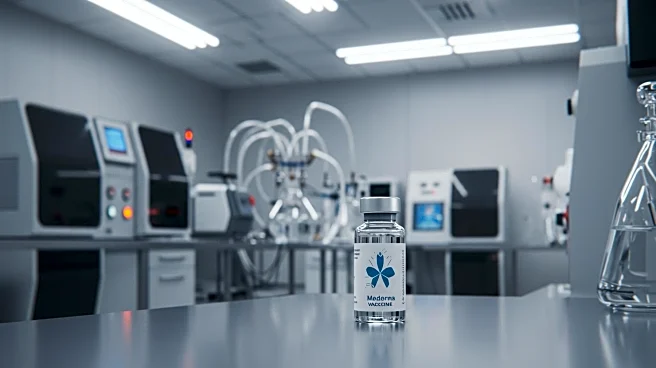What's Happening?
Moderna is making significant strides in the mRNA vaccine market through strategic manufacturing expansions and regulatory approvals. The company has invested $1.5 billion in a new facility in Laval, Quebec, which is now operational under Health Canada's Drug Establishment License. This facility can produce up to 30 million doses annually, with scalability to 100 million during pandemics. Additionally, Moderna has partnered with Novocol Pharma in Ontario for fill-finish operations, enhancing its supply chain resilience. On the regulatory front, Moderna's bivalent mRNA-1083 vaccine, targeting both SARS-CoV-2 and influenza, has received approvals in Europe, Japan, and Switzerland. This vaccine has shown superior performance in Phase III trials, particularly against influenza B and Omicron strains, positioning it as a leader in the dual-target vaccine market.
Why It's Important?
Moderna's strategic moves are crucial in the evolving post-pandemic vaccine landscape. By localizing production in Canada, the company reduces global supply chain risks and aligns with environmental goals, potentially setting a precedent for other pharmaceutical companies. The regulatory approval of mRNA-1083 across key markets enhances Moderna's competitive edge, especially against rivals like Pfizer, whose dual-target vaccines have not matched Moderna's efficacy in certain areas. These developments could significantly boost Moderna's revenue, with projections between $1.5 billion and $2.2 billion for 2025. The company's focus on cost-cutting and operational efficiency is expected to improve margins, making it a strong contender in the mRNA vaccine sector.
What's Next?
Moderna's future plans include further decentralizing production across Canada, the UK, and Australia, reducing reliance on Swiss facilities. This strategy not only strengthens supply chain resilience but also supports local economies. The company is also focusing on expanding its vaccine pipeline, including next-generation vaccines and potential oncology and rare disease therapies. Investors are advised to watch for the success of Canada's 2025 fall vaccination campaign, additional regulatory approvals for mRNA-1083, and progress in Moderna's oncology pipeline. These factors will be critical in determining the company's ability to achieve its goal of breakeven by 2028.










